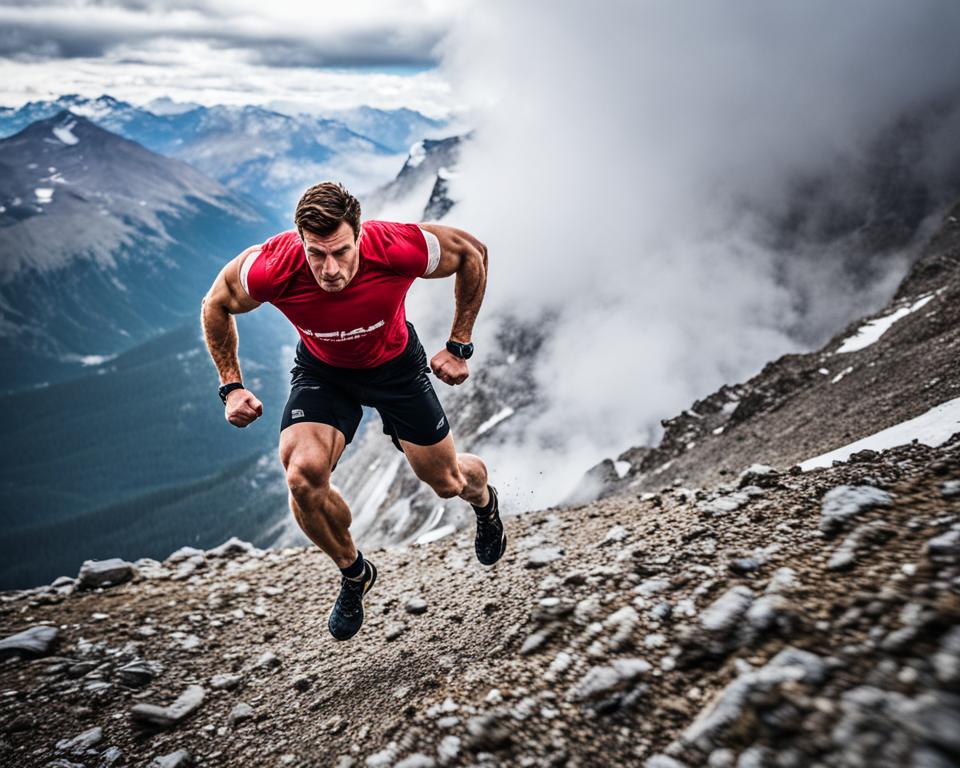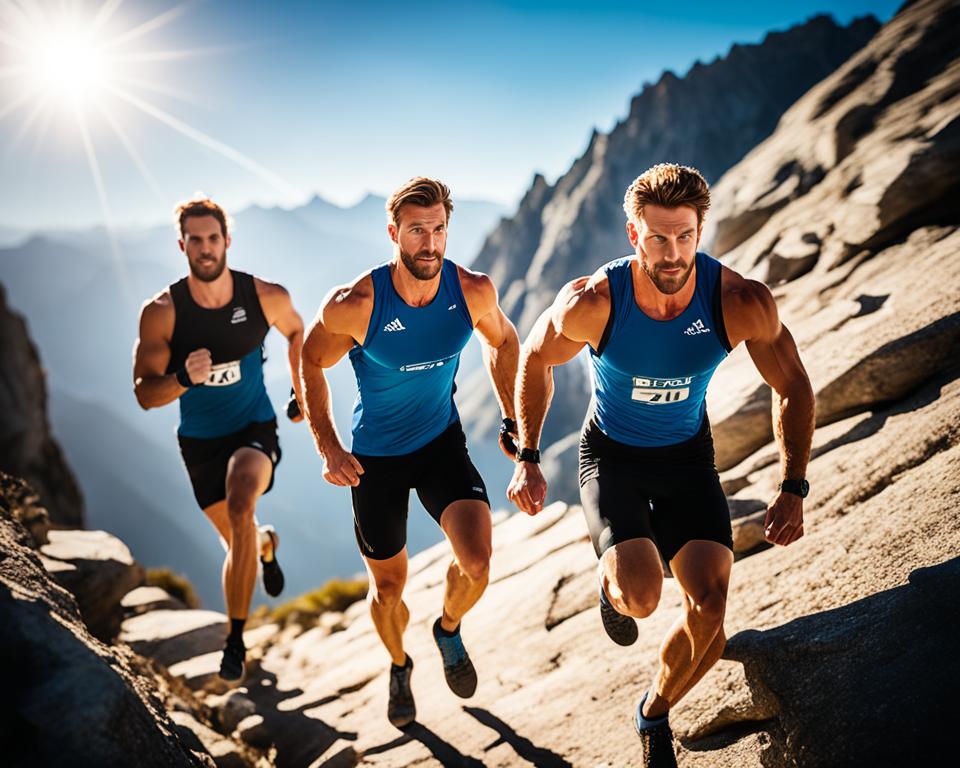As an athlete, I am always striving to enhance my performance and build resilience. Recently, I discovered the incredible benefits of high-end outdoor training camps that cater specifically to elite athletes like myself. These camps provide a unique and transformative environment that helps me maximize my potential and push my limits.
At these camps, I have the opportunity to train amidst nature, away from the daily distractions of life. Surrounded by breathtaking landscapes, I am able to immerse myself fully in my workouts and focus on improving both my physical and mental abilities. The outdoor setting not only challenges me physically but also instills a sense of calm and clarity that is essential for peak performance.
One of the key elements of these high-end outdoor training camps is the integration of altitude training. The science behind altitude training is fascinating. By exposing myself to higher altitudes, my body adapts to the reduced oxygen levels, which in turn improves my endurance and overall performance. It’s like giving myself a competitive edge by training in a controlled and challenging environment.
But it’s not just the altitude training that sets these camps apart. Nature-based learning experiences also play a significant role in my development as an athlete. Engaging in outdoor activities and experiential learning not only enhances my physical skills, but also cultivates teamwork, problem-solving abilities, and mental well-being.
Implementing outdoor education curriculum in my training regimen has been a game-changer. Through wilderness survival skills, team-building exercises, and navigation challenges, I have gained a deeper understanding of myself and my abilities, ultimately elevating my performance on the field.
Overcoming the challenges that high-altitude environments present has been both demanding and rewarding. It has taught me resilience, mental fortitude, and the importance of proper acclimatization. The strategies I have learned for dealing with reduced oxygen intake have given me a competitive edge that I carry with me into every competition.
Nature education programs offered at these camps have also had a profound impact on my mental well-being. It’s incredible how just being in nature, engaging in outdoor activities, and learning about the environment can reduce stress and increase my overall resilience. It’s a holistic approach to athletic development that not only improves my performance but also enhances my well-being.
As I continue my journey as an elite athlete, I am grateful for the opportunities provided by high-end outdoor training camps. The science, nature, and challenges found in these camps have truly transformed my training and elevated my performance. I encourage every elite athlete to consider the benefits of these camps and unlock their full potential.
Key Takeaways:
- High-end outdoor training camps offer elite athletes a unique and transformative environment to enhance performance and build resilience.
- Altitude training at these camps improves endurance and provides a competitive edge by challenging the body to adapt to reduced oxygen levels.
- Nature-based learning experiences enhance physical skills, teamwork, problem-solving abilities, and mental well-being.
- Implementing outdoor education curriculum in training regimens promotes holistic athletic development.
- Overcoming challenges at high altitudes develops resilience, mental fortitude, and proper acclimatization strategies.
The Science of Altitude Training: Maximizing Performance
Altitude training is a scientific approach used by elite athletes to maximize their performance. In this section, we will delve into the details of high-altitude training, including how the body adapts to the challenges of less oxygen at higher altitudes and the concept of the “live high, train low” philosophy.
Understanding High-Altitude Training
High-altitude training involves exposing athletes to environments with reduced oxygen levels, typically above 2,500 meters (8,000 feet) above sea level. This simulated altitude challenges their bodies to adapt and perform optimally under conditions with less available oxygen. The goal is to enhance the body’s ability to deliver and utilize oxygen during exercise, ultimately improving endurance and overall athletic performance.
Adapting to Less Oxygen for Competitive Edge
When exposed to high-altitude environments, the body undergoes physiological changes to compensate for lower oxygen levels. This adaptation includes an increase in the production of red blood cells and the release of the hormone erythropoietin (EPO), both of which enhance the oxygen-carrying capacity of the blood. Additionally, altitude training stimulates the development of new capillaries and improves the body’s utilization of oxygen, resulting in improved muscular endurance and performance.
The “Live High, Train Low” Philosophy
The “live high, train low” philosophy is a key component of altitude training. Athletes live at high altitudes to stimulate the physiological adaptations necessary for improved oxygen transport, while training at lower altitudes where they can maintain higher training intensities. This approach maximizes the training stimulus and allows athletes to achieve the best of both worlds: the benefits of altitude adaptation while still being able to execute high-quality workouts.
In summary, altitude training offers elite athletes a scientifically proven method to enhance their performance. By understanding the principles of high-altitude training, adapting to the challenges of less oxygen, and embracing the “live high, train low” philosophy, athletes can optimize their oxygen-carrying capacity, improve endurance, and elevate their overall competitive edge.
Key Benefits of Nature-Based Learning Experiences
Nature-based learning experiences provide a multitude of benefits for elite athletes. Training in natural environments offers a refreshing change of scenery from traditional indoor facilities, allowing athletes to immerse themselves in the beauty and tranquility of nature. This connection with the outdoors not only enhances physical fitness but also promotes mental well-being and fosters important life skills.
Outdoor training in natural environments offers a unique opportunity for athletes to engage in physical activities that challenge their bodies in different ways. Whether it’s running on trails, climbing rocks, or kayaking through rivers, the varied terrain and elements encountered during these adventures help athletes build strength, endurance, and flexibility that can translate into improved performance in their respective sports. The integration of natural elements such as uneven terrain and unpredictable weather conditions also enhances athletes’ balance, coordination, and agility.
“Nature-based learning experiences provide athletes with a sense of freedom and inspiration, sparking creativity and innovation in their training regimens.”
Engaging in outdoor training adventures also has significant positive implications for athletes’ mental well-being. Spending time in nature has been shown to reduce stress, anxiety, and fatigue while improving mood and overall happiness. The peacefulness and tranquility of natural environments create a soothing backdrop for athletes to clear their minds, find solace, and rejuvenate their spirits. Immersion in nature also helps athletes develop a deeper sense of self-awareness and mindfulness, allowing them to be fully present in their training and competitions.
Collaborative outdoor activities, such as team-building exercises and problem-solving challenges, promote teamwork and communication skills among athletes. These experiences require athletes to rely on each other, communicate effectively, and collaborate to overcome obstacles. The shared sense of achievement and camaraderie gained from these activities foster a positive team dynamic, leading to enhanced cohesion, trust, and resilience.

To summarize, nature-based learning experiences offer a multitude of benefits for elite athletes. From physical fitness improvements to mental well-being enhancements and the development of essential life skills, outdoor training in natural environments provides a holistic approach to athlete development. By embracing nature and incorporating outdoor adventures into their training regimens, athletes can tap into the transformative power of the outdoors and unlock their full potential.
Elite Endurance Training in Bekoji: The Fastest Place on Earth
Bekoji, a small town in Ethiopia, has gained recognition as the “fastest place on Earth” due to its success in producing gold medalist endurance runners. The altitude of Bekoji plays a significant role in the development of these world champions, providing them with a unique advantage in their training.
Altitude’s Role in Building World Champions
Altitude training is known for its ability to enhance endurance and performance in elite athletes. When training at high altitudes, such as those found in Bekoji, the body undergoes adaptations to cope with the reduced oxygen levels. These adaptations include increased red blood cell production, improved oxygen utilization, and enhanced aerobic capacity. As a result, athletes who train at altitude develop exceptional endurance and are better equipped to handle the challenges of competitive racing.
Bekoji’s Altitude Advantage for Runners
The high-altitude environment in Bekoji provides a natural advantage for endurance runners. The town sits at an elevation of approximately 2,800 meters (9,200 feet), forcing athletes to train in a low-oxygen environment. This exposure to reduced oxygen levels stimulates physiological adaptations that improve performance. Athletes who train in Bekoji develop a higher red blood cell count, which allows for greater oxygen delivery to the muscles and enhances endurance.
The image above showcases the rigorous training environment in Bekoji, where athletes push their limits to excel in endurance running.
Bekoji’s success in endurance running can be attributed to its unique combination of high-altitude training, dedicated athletes, and expert coaching. The town’s athletes have achieved remarkable success in long-distance running events, including multiple Olympic gold medals and world records.
The altitude advantage of Bekoji not only builds physical endurance but also instills discipline, mental toughness, and determination in athletes. The challenging training conditions prepare them to overcome obstacles and excel in highly competitive races.
Outdoor Learning Adventures for High-Performance Athletes
Engaging in experiential learning activities and participating in outdoor learning adventures can have significant benefits for high-performance athletes. These activities provide a unique and immersive experience that enhances athletic training, promotes skill development, and fosters teamwork and leadership abilities.

Engaging in Experiential Learning Activities
Experiential learning activities involve hands-on experiences, practical applications, and reflective observation. For high-performance athletes, engaging in such activities can offer valuable insights and enhance their training outcomes. These activities can range from outdoor challenges like rock climbing and obstacle courses to problem-solving exercises and team-building activities.
Experiential learning allows athletes to transfer skills and knowledge gained through direct experience to their sporting endeavors. By stepping out of their comfort zones and facing diverse challenges, athletes can develop adaptability, resilience, and problem-solving skills.
Outdoor Education Programs for Athletic Training
To provide a structured approach to incorporating outdoor experiences into athletes’ training regimens, many organizations offer outdoor education programs specifically designed for high-performance athletes. These programs aim to optimize athletic development by integrating academics, physical training, and outdoor experiences.
Outdoor education programs often include activities such as wilderness excursions, leadership workshops, and environmental education. These experiences expose athletes to a range of challenges and cultivate skills like decision-making, communication, and teamwork, which are crucial for success in sports.
By participating in outdoor education programs, athletes not only improve their athletic abilities but also develop a deeper connection to nature and a sense of environmental stewardship. These programs offer a holistic approach to training and contribute to the overall growth and well-being of high-performance athletes.
Implementing Outdoor Education Curriculum in Training Regimens
Implementing outdoor education curriculum in training regimens is a crucial component of enhancing the development of elite athletes. By integrating outdoor experiences into their training programs, athletes have the opportunity to acquire a diverse range of skills that are essential for high-performance sports.
Outdoor education curriculum offers a unique and immersive learning environment that goes beyond traditional training methods. It involves activities such as wilderness survival skills, team-building exercises, and navigation challenges, which provide athletes with valuable opportunities to develop physical and mental abilities.
One key aspect of outdoor education curriculum is the emphasis on wilderness survival skills. By learning how to navigate and survive in challenging outdoor environments, athletes develop resilience, problem-solving skills, and adaptability. These skills are transferable to the sports arena, enabling athletes to overcome obstacles and perform at their best, even under adverse circumstances.
Team-building exercises are another integral part of outdoor education curriculum. By engaging in activities that promote teamwork and collaboration, athletes learn to communicate effectively, trust their teammates, and work towards a common goal. These skills are vital for team sports, where effective teamwork and coordination can make the difference between victory and defeat.
The inclusion of navigation challenges in outdoor education curriculum further enhances the athletes’ mental and physical abilities. By mastering the skills required for navigation in unfamiliar environments, athletes develop spatial awareness, critical thinking, and decision-making skills. These skills are invaluable for sports that require quick and strategic thinking, such as orienteering or adventure racing.
By implementing outdoor education curriculum in training regimens, coaches and trainers can create a well-rounded development program that goes beyond traditional sports training. The integration of outdoor experiences provides athletes with a holistic approach to their physical and mental growth, ultimately enhancing their performance in high-pressure competitive settings.
Overcoming Challenges: Athletes’ Adaptation at High Altitudes
Athletes face unique challenges when adapting to high altitudes. Training and competing in high-altitude environments require athletes to make adjustments to optimize their performance and overall well-being.
Rates of Perceived Exertion and Its Impact
One of the main challenges athletes encounter at high altitudes is the increased rates of perceived exertion (RPE). RPE refers to how intense an athlete perceives their effort to be during physical activity. At high altitudes, the reduced oxygen levels can cause athletes to experience higher RPE, leading to a feeling of increased effort and fatigue.
To manage RPE effectively, athletes need to be aware of their perceived exertion levels and adjust their training intensity accordingly. It is important to listen to their bodies and not push beyond their limits, as excessive exertion can lead to overtraining or injury.
Dealing with Reduced Oxygen Intake
Another significant challenge athletes face at high altitudes is dealing with reduced oxygen intake. The lower oxygen levels can affect aerobic capacity, oxygen-carrying capacity, and overall endurance.
To address this challenge, athletes often engage in altitude training or acclimatization strategies. These methods involve gradually exposing the body to higher altitudes to stimulate physiological adaptations, such as increased red blood cell production and improved oxygen utilization. These adaptations can enhance the body’s ability to perform at high altitudes.

Adaptation at High Altitudes
Adaptation to high altitudes is a complex process that varies among individuals. Some athletes may adapt more quickly and efficiently than others. It is essential for athletes to allow sufficient time for acclimatization and gradually increase their training intensity at high altitudes.
Proper nutrition, hydration, and rest also play crucial roles in facilitating adaptation at high altitudes. Athletes should maintain a balanced diet, stay adequately hydrated, and ensure sufficient sleep and recovery to optimize their performance and minimize the negative effects of altitude.
| Challenges | Strategies |
|---|---|
| Rates of Perceived Exertion | Monitor and adjust training intensity accordingly |
| Reduced Oxygen Intake | Engage in altitude training or acclimatization strategies |
| Individual Adaptation | Allow sufficient time for acclimatization and gradual training intensity increase |
| Nutrition, Hydration, and Rest | Maintain a balanced diet, stay hydrated, and prioritize adequate sleep and recovery |
By understanding these challenges and implementing the appropriate strategies, athletes can overcome the obstacles posed by high altitudes and optimize their performance in these environments.
Nature Education Programs: Enhancing Athletes’ Mental Well-being
Elite athletes not only strive for physical excellence but also recognize the importance of mental well-being in achieving peak performance. Nature education programs offer a valuable avenue for enhancing the mental well-being of these athletes, providing them with essential tools and experiences to navigate the demanding world of competitive sports.
Exposure to nature has been proven to have significant positive effects on mental health. Studies have shown that spending time in natural environments can reduce stress, alleviate symptoms of anxiety and depression, and improve overall psychological well-being. For elite athletes, who often face immense pressure and stress, incorporating nature-based experiences into their training programs is essential for maintaining a healthy mind.
Outdoor activities and environmental education play a critical role in this process. Engaging in outdoor activities, such as hiking, trail running, or even team-building exercises in natural settings, allows athletes to disconnect from their daily routines and immerse themselves in the calming and rejuvenating effects of nature. The serene beauty of the outdoors provides a much-needed respite from the intensity of training and competition.
“Nature is not a place to visit. It is home.” – Gary Snyder
Moreover, environmental education programs within these nature-based experiences offer athletes a unique opportunity to connect with the natural world and gain a deeper understanding of its interconnectedness with their own well-being. Learning about the importance of sustainability, conservation, and environmental stewardship can instill a sense of purpose and perspective, contributing to the athletes’ personal growth and resilience in the face of challenges.
The integration of nature education programs into training regimens not only enhances the mental well-being of elite athletes but also fosters invaluable qualities such as focus, adaptability, and emotional intelligence. By developing a stronger connection with nature, athletes learn to appreciate the beauty and fragility of the environment, reinforcing their commitment to their own well-being and that of the planet.
| Benefits of Nature Education Programs for Elite Athletes |
|---|
| Reduces stress and anxiety |
| Improves overall psychological well-being |
| Enhances focus and concentration |
| Fosters adaptability and resilience |
| Promotes emotional intelligence and self-awareness |
Incorporating nature education programs into the training and development of elite athletes is a promising way to support their mental well-being and overall performance. By nurturing their connection with nature, athletes can find balance amidst the demands of their sport and discover a lifelong source of inspiration, solace, and strength.
Environmental Education Experiences in Elite Sports Training
Athletic success is not solely determined by physical prowess but also influenced by environmental factors. In elite sports training, incorporating environmental education experiences can play a crucial role in enhancing athletes’ performance and overall well-being.
Linking Environmental Factors to Athletic Success
Environmental factors, such as access to natural surroundings and exposure to different terrains, can have a profound impact on athletic success. Studies have shown that immersing athletes in nature can improve their mental focus, increase their resilience, and enhance their ability to adapt to challenging situations. By integrating environmental education experiences into training regimens, athletes can develop a deeper connection with the natural world and gain a competitive edge.
Incorporating Nature into Daily Training
One effective way to integrate nature into daily training routines is through outdoor conditioning sessions. These sessions can take place in scenic locations, allowing athletes to engage with the environment while improving their physical fitness. Outdoor conditioning exercises, such as trail runs and obstacle courses, not only provide a change in scenery but also challenge athletes to navigate different terrains, improve their agility, and build mental fortitude.
In addition to outdoor conditioning, mindfulness exercises in natural settings can foster athletes’ mental well-being. Mindfulness practices, such as meditation and deep breathing exercises, can be conducted amidst serene landscapes, promoting relaxation, mental clarity, and stress reduction. Connecting with the natural environment in these moments of contemplation can contribute to athletes’ overall emotional balance and resilience.

Overall, integrating environmental education experiences into elite sports training can have a profound impact on athletes’ success. By embracing and connecting with nature, athletes can enhance their physical and mental capabilities, enabling them to perform at their best when it matters most.
Conclusion
In conclusion, high-end outdoor training camps provide valuable opportunities for elite athletes to enhance their performance and build resilience. These camps offer a unique environment for athletes to train in natural settings, away from the distractions of everyday life. By immersing themselves in nature and challenging outdoor activities, elite athletes can tap into the physical and mental benefits of outdoor learning adventures.
Embracing nature-based learning experiences allows athletes to connect with the natural world and gain a deeper understanding of themselves and their abilities. The implementation of outdoor education curriculum further enhances their training regimens, incorporating wilderness survival skills, team-building exercises, and navigation challenges. By overcoming challenges at high altitudes, such as rates of perceived exertion and reduced oxygen intake, athletes can improve their adaptation and optimize their performance in high-altitude environments.
Overall, high-end outdoor training camps offer a holistic approach to athletic development and well-being. They provide elite athletes with the tools and experiences they need to unlock their full potential and achieve success in their respective sports. By utilizing these transformative training camps, athletes can enhance their performance, increase resilience, and ultimately become champions in their field.
